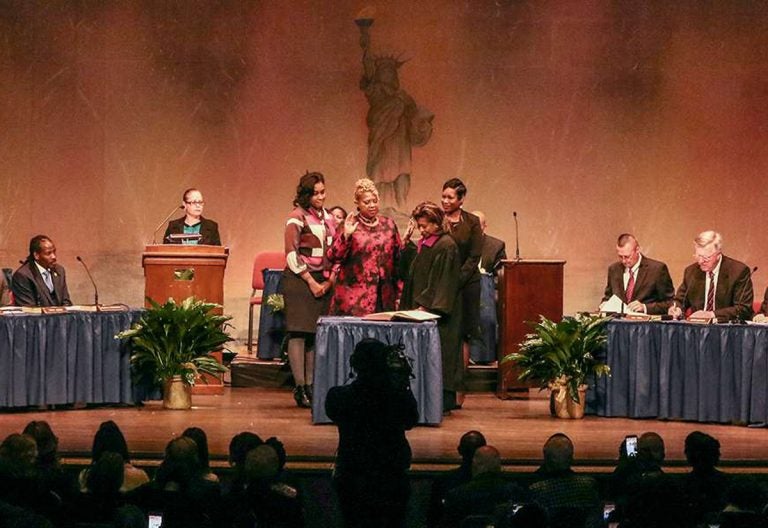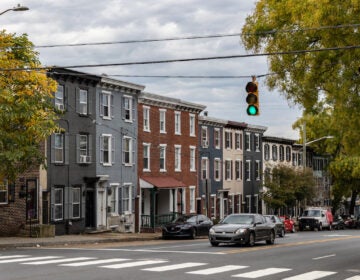Wilmington’s divided City Council changes controversial law to fill vacancy
The first nominee was the outgoing member’s twin. A second pick never got a vote. The new process is more inclusive and public, but rancor remains.
Listen 0:55
Wilmington’s divided City Council, pictured when members were sworn in after the 2016 election, changed the controversial process to fill a vacancy but there doesn’t appear to be an end in sight for the bickering among members. (City of Wilmington)
Wilmington City Council has been bogged down for nearly three months by a nasty battle over filling a seat left vacant after the November election.
There’s now a solution in sight but it could lead to even more rancor and might only be a temporary fix.
The controversy began with Nnamdi Chukwuocha’s election as state representative on Nov. 6. Instead of holding a special election to fill the 1st District seat, Chukwoucha’s departure triggered a city law that lets the council president pick a panel composed of five of the 12 remaining members to interview candidates and nominate a replacement. The full council gets to approve or reject the panel’s selection.
Councilmembers rejected the first pick, Chukwoucha’s identical twin, Albert Mills. The pair is well-known as the Twin Poets and were named Delaware’s poets laureate in 2015.
Some members thought Mills would align, like this brother, with the council president, Hanifa Shabazz, and Mayor Mike Purzycki.
Many votes in city council have been passed or rejected by a 7-6 margin, and some perceived that Mills would be the clinching vote for measures favored by Shabazz and Purzycki, Councilman Bob Williams told WHYY in December.
Then seven members put forward the name of district resident Subira Ibrahim. A special meeting in January to vote on Ibrahim was canceled after one of the seven co-sponsors, Michelle Harlee, pulled her support after conferring with city lawyers. Harlee said then she was concerned that doing so would violate the law that mandates the five-member nominating panel.
So Harlee introduced a measure to allow all council members to interview candidates and nominate a replacement. That measure was approved 7-3 Thursday after it was amended to make the interview and deliberative process public.
Still, the meeting was filled with more rancor, with council members continuing to spar and accuse each other of undermining fellow members and the process.
Members hope to have the seat filled by March.
‘Continued resistance to whatever we want to do’
Shabazz said she has tried to accommodate all members’ concerns, even though some are relentless in challenging her authority and how she runs a meeting.
“Now the public can hear the interviews so can see the applicant and their responses. If they truly are a good candidate for their position or if it’s a friendly kind of replacement,’’ Shabazz told WHYY on Friday.
Some are also trying to get the state legislature to change the city charter to allow for a special election.
Councilman Williams, who voted no Thursday, said one issue he had was that each council member now can nominate three candidates for the vacancy to what is known as the “committee of the whole.’’
“I just found we are going down a rabbit hole that we didn’t need to go down,’’ Williams said. “Let’s just get the seat filled and [then] rewrite the policy and close all the loopholes.
Williams said he would ultimately like to see the legislature change the charter. In the meantime, he said, the better way would be to allow members to introduce their own bills on behalf of a candidate until one gets approved by the majority.
Shabazz said that beyond this controversy, she’s frustrated with the fact that so many council meetings devolve into accusations and recriminations.
“I don’t know what it is, just the continued resistance to whatever we want to do to move the city forward,’’ she said. “But we end up stumbling, and not going anywhere.”
Williams, a former city police officer who often votes against what Shabazz wants but doesn’t get into contentious exchanges with fellow members, said the bickering is bothersome.
“If you can make sense of it,’’ he said, “please send me the blueprint.”
WHYY is your source for fact-based, in-depth journalism and information. As a nonprofit organization, we rely on financial support from readers like you. Please give today.





